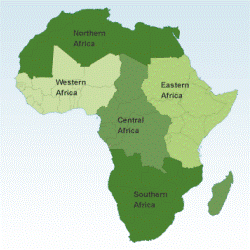State of Internet Gambling Legislation in Africa

Online gambling has proven to be a valuable source of revenue for governments, which is why nations around the world are in various stages of iGaming legislation. Africa is no exception, and a number of the continent’s countries have either already passed iGaming laws, or are in the process of legalizing and regulating online gaming. Let’s take a look at the state of online gambling in some key African countries:
South Africa
During Apartheid, only one casino operated in South Africa, namely Sun City. Today, South Africa has a total of 38 licensed brick and mortar casinos, while there were also another 450 bookmaker outlets, and 440 totalizator outlets operating in South Africa last year. South Africans can bet on horse racing and sports, play a full range of games at casinos, participate in bingo games for money and use limited pay-out gambling terminals across the country. Still, online gambling is illegal in the southern-most Africa nation. In 2008, legislators attempted to pass a piece of legislation called the National Gambling Amendment Act that would have regulated online gambling, but efforts proved unsuccessful. At this time, there are no serious discussions about revisiting the topic, leaving South African online gamblers forced to play at illegal and unregulated offshore gambling sites.
Nigeria
Similarly to South Africa, Nigeria did not legalize gambling until the 1990s, and the country has a stricter set of criteria when it comes to issuing licenses than South Africa. Today, there are three licensed land-based casinos in Nigeria: Lagos’ the Sun International Federal Palace Hotel & Casino; Le Meridien Eko Hotel & Casino, also in Lagos; and the Transcorp Hilton of Abuja. Lotteries and sports betting are also legal in Nigeria. Unlike South Africa, Nigerian lawmakers have also passed legislation to legalize online gambling within their borders. Furthermore, a number of foreign operators have already received licenses to offer online poker, online casino games and online sports betting in the country. The most popular sites are nairabet.com and supabets.com.ng. Nevertheless, Nigerian regulators have found it difficult to strictly enforce iGaming laws, so there are still many unlicensed offshore sites operating illegally in the country.
Kenya
Land-based casinos have been legal in Kenya for decades, and the country relies heavily on revenues generated by a wide range of gambling activities. In 2011, Kenyan regulators issued the first license for an online gaming site, leading to the launch of BetKenya.com. Since then, other operators have followed suit, giving Kenyans access to numerous sites for online poker, casino games and sports betting. Changes to Kenya’s gambling laws, though, may put a bit of a damper on the industry. In June 2017, the President of Kenya, Uhuru Kenyatta, signed a new finance bill that levies a 35 percent tax on brick and mortar and online betting, lotteries and casinos. This is a steep increase over previous tax laws, which required online operators to only pay a 7.5 percent tax on gross gaming revenues.
Other Mentions
Other important markets in Africa include Zambia, Ghana and Uganda, which all allow for various forms of gambling. In recent years, these countries have subsequently noted increasing growth in their respective gambling industries.
Background and Forecast
Online gambling in Africa got its first break after Uganda introduced its Casino and Gaming Bill in 2004, followed by sports betting three years later. Helping to explain some of the industry’s subsequent impressive growth includes the continent’s high unemployment and poverty rate leading people to seek other sources of money. In addition, interest in sports such as soccer has created a desire for people to wager on the games’ outcome in order to increase their enjoyment of matches, especially with African soccer players counted amongst some of the game’s best known players over the past ten years or so.
Consequently, Africa is expected to generate 142% more income from gambling in 2020 than it did in 2004, with the positive trend forecast to continue over the coming period. One of the drawbacks of the industry, however, is that not enough time has elapsed to have put sufficient strategies in place for dealing with gambling addiction problems, and as an article which appeared in sabreakingnews, stated:
“Overall, gambling presents those that wager with an opportunity to win. The psychological and financial effects which follow losing these wagers can be devastating. The government and businesses profit from this legalized gambling but individuals can be the ones to suffer. The money that goes into this industry is huge, with the smaller individuals providing the small amounts that they actually have.”
Needless to say, this is an area that needs to be addressed in order to prevent some of the social costs associated with gambling from becoming prevalent, making the setting up of adequate support for potential problem gamblers a pressing issue for the continent’s expanding gambling market.







